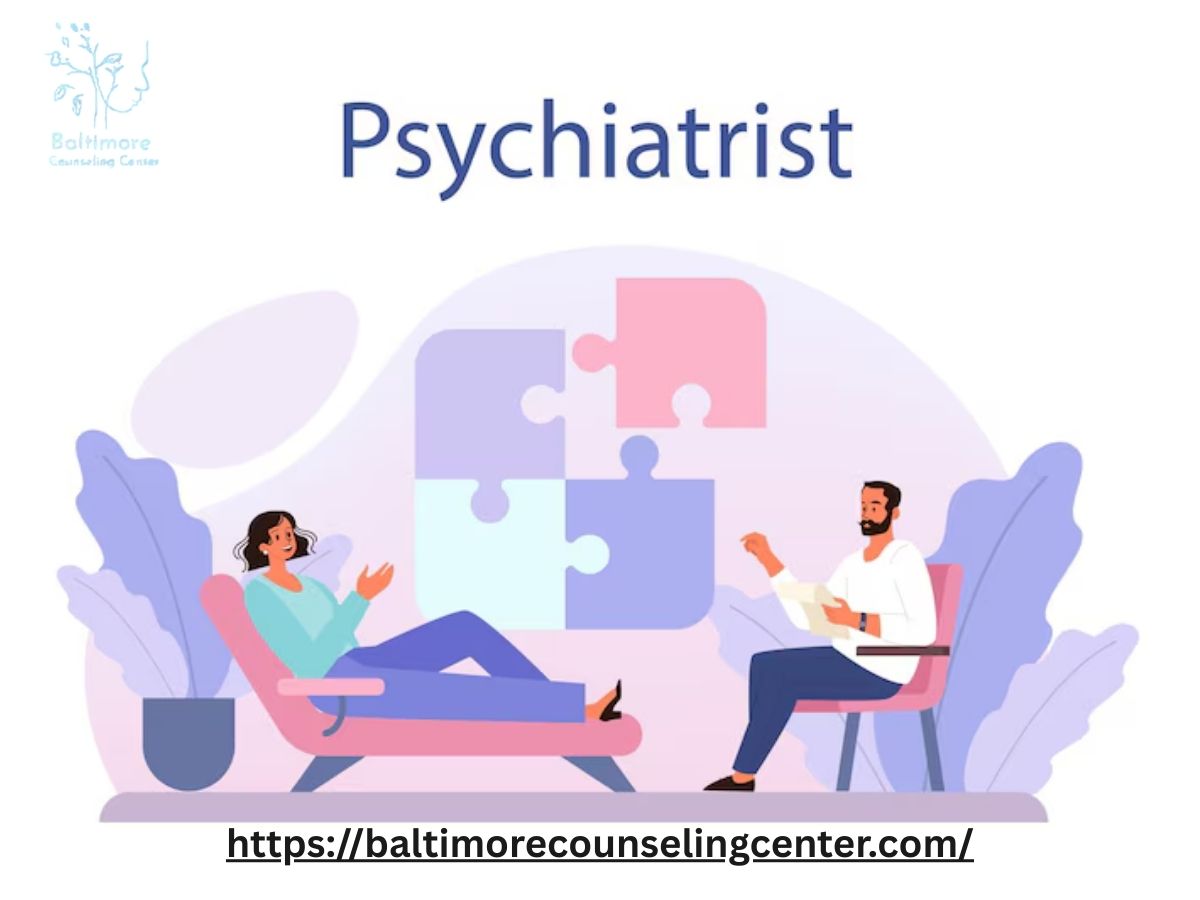Are you curious about what a psychiatrist does? Understanding their role can be crucial for anyone navigating mental health challenges.
Imagine unlocking the potential of your mind or helping a loved one find peace. A psychiatrist might just be the key. They are not just doctors; they are guides to better mental well-being. By reading on, you’ll discover how psychiatrists can make a significant difference in your life or the life of someone you care about.
Explore how their expertise and treatment approaches could pave the path to a healthier, happier you. Dive in to learn more about this vital profession and how it could impact your mental health journey.

Role Of A Psychiatrist
Psychiatrists are medical doctors who specialize in mental health. They diagnose, treat, and help prevent mental disorders. Their role is vital in understanding and treating complex psychological issues. They combine medical knowledge with psychological theories to provide comprehensive care.
Understanding the role of a psychiatrist involves exploring several key areas. They are critical in diagnosing mental health conditions, prescribing medication, and offering therapy.
Diagnosis And Assessment
Psychiatrists conduct thorough assessments to diagnose mental health disorders. They use interviews, questionnaires, and medical tests. This helps them understand a patient’s condition.
| Assessment Method | Description |
| Interviews | Conversations to gather patient history and symptoms. |
| Questionnaires | Structured forms to evaluate mental health. |
| Medical Tests | Physical exams to rule out other health issues. |
Prescribing Medication
Medication can be crucial in treating mental disorders. Psychiatrists prescribe and manage medication to alleviate symptoms. They monitor how medication affects the patient, adjusting as needed.
- Antidepressants for depression
- Anxiolytics for anxiety
- Antipsychotics for schizophrenia
Providing Therapy
Therapy is another significant aspect of a psychiatrist’s role. They offer different types of therapy based on the patient’s needs. This can include cognitive behavioral therapy, psychoanalysis, or family therapy.
- Cognitive Behavioral Therapy (CBT)
- Psychoanalysis
- Family Couple Therapy
Therapy sessions help patients understand their thoughts and feelings. They also guide them towards healthier coping mechanisms.
Collaborating With Other Professionals
Psychiatrists often work alongside other healthcare professionals. This ensures a comprehensive treatment plan for the patient. Collaboration can include psychologists, social workers, and nurses.
In summary, psychiatrists play a multifaceted role in mental health care. Their expertise is vital in diagnosing, prescribing medication, and providing therapy. They are committed to improving the mental health and well-being of their patients.
Education And Training
A psychiatrist is a medical doctor specializing in mental health. They diagnose, treat, and help prevent emotional and behavioral disorders. Education and training are crucial for becoming a psychiatrist. This journey is long and requires dedication and commitment. Let’s explore the steps needed to become a psychiatrist.
Undergraduate Education
Becoming a psychiatrist starts with a bachelor’s degree. Students often choose a pre-med track. Common majors include biology, psychology, or chemistry. These subjects lay the foundation for medical school.
Medical School
After earning a bachelor’s degree, the next step is medical school. This typically lasts four years. The first two years focus on classroom-based learning. Students study subjects like anatomy, pharmacology, and medical ethics. The last two years involve clinical rotations. Here, students gain practical experience in different medical fields.
Residency Training
Upon completing medical school, graduates enter a residency program. Psychiatry residencies usually last four years. During this time, residents work under supervision. They learn to diagnose and treat mental health conditions. They also gain hands-on experience in various psychiatric settings.
Board Certification
After residency, psychiatrists can seek board certification. This is done through the American Board of Psychiatry and Neurology. Certification involves passing a rigorous exam. It demonstrates a psychiatrist’s expertise and commitment to quality care.
Continuing Education
Learning does not stop after certification. Psychiatrists must engage in continuing education. This keeps them updated on new research and treatment methods. It also ensures they provide the best care possible.
| Stage | Duration | Focus |
| Undergraduate Education | 4 years | Pre-medical courses |
| Medical School | 4 years | Medical knowledge and clinical skills |
| Residency Training | 4 years | Specialized psychiatric training |
Common Disorders Treated
Psychiatrists are medical doctors who specialize in mental health. They diagnose, treat, and help prevent mental and emotional disorders. Their work involves understanding the mind and its complex workings. Often, they provide therapy and prescribe medications to manage symptoms. Common disorders treated by psychiatrists vary widely. From anxiety to mood disorders, their expertise covers a broad spectrum. Below are some of the key disorders commonly addressed by psychiatrists.
Anxiety Disorders
Anxiety disorders are among the most frequent issues treated by psychiatrists. These disorders include generalized anxiety disorder (GAD), panic disorder, and social anxiety disorder. Symptoms often involve excessive worry, restlessness, and difficulty concentrating. Treatment usually includes therapy, medication, or a combination of both. Psychiatrists aim to reduce symptoms and improve daily functioning.
Depressive Disorders
Depression is a common mental health challenge. It affects mood, energy, and daily activities. Psychiatrists treat different forms of depression, such as major depressive disorder and dysthymia. Treatment may involve antidepressants or psychotherapy. The goal is to help patients manage symptoms and lead fulfilling lives.
Bipolar Disorder
Bipolar disorder is characterized by mood swings. These include emotional highs (mania) and lows (depression). Psychiatrists use mood stabilizers and other medications to manage this condition. Therapy also plays a crucial role in treatment. It helps patients understand their condition and maintain stability.
Schizophrenia
Schizophrenia is a severe mental disorder. It affects how a person thinks, feels, and behaves. Symptoms may include delusions, hallucinations, and disorganized thinking. Psychiatrists treat schizophrenia with antipsychotic medications. Therapy can support medication by helping patients manage symptoms.
Obsessive-compulsive Disorder (ocd)
OCD involves unwanted and repetitive thoughts and behaviors. These can interfere with daily life. Psychiatrists often prescribe selective serotonin reuptake inhibitors (SSRIs) to manage OCD. Cognitive-behavioral therapy is also effective. It helps patients confront and reduce their obsessions and compulsions.
Post-traumatic Stress Disorder (ptsd)
PTSD can develop after a traumatic event. Symptoms include flashbacks, nightmares, and severe anxiety. Treatment involves therapy and medication. Psychiatrists work to help patients process trauma and regain control over their lives.
Therapeutic Approaches
Psychiatrists play a crucial role in mental health care. They are medical doctors specializing in diagnosing and treating mental illnesses. One key aspect of their practice involves therapeutic approaches. These approaches are essential tools that psychiatrists use to help patients manage their mental health. By using a mix of medication management and psychotherapy techniques, psychiatrists aim to provide comprehensive care tailored to individual needs.
Medication Management
Medication management is a vital part of psychiatric treatment. It involves selecting, prescribing, and monitoring medications to help patients manage their symptoms. Psychiatrists carefully consider various factors before prescribing any medication:
- Diagnosis: Understanding the specific mental health condition.
- Patient History: Reviewing past treatments and responses.
- Side Effects: Considering potential side effects of medications.
- Interactions: Checking for interactions with other medications.
Once a medication is prescribed, psychiatrists monitor its effectiveness and adjust dosages as needed. They may also switch medications if the current one is not effective. Regular follow-ups ensure that the medication continues to benefit the patient while minimizing any adverse effects.
Medication management requires collaboration between the psychiatrist and the patient. Patients need to communicate openly about their experiences with the medication. This helps the psychiatrist make informed decisions and provide optimal care.
Psychotherapy Techniques
Psychotherapy techniques are another key component of psychiatric treatment. These techniques involve structured talking sessions that aim to improve mental health. Psychiatrists use various psychotherapy methods based on the patient’s needs:
- Cognitive Behavioral Therapy (CBT): Focuses on changing negative thought patterns.
- Dialectical Behavior Therapy (DBT): Helps regulate emotions and develop coping skills.
- Psychodynamic Therapy: Explores unconscious thoughts and past experiences.
- Interpersonal Therapy: Addresses issues within personal relationships.
Each technique has its unique approach and benefits. CBT, for example, is effective for depression and anxiety. DBT is often used for borderline personality disorder. Psychotherapy sessions can be one-on-one, with family, or in groups, providing a flexible framework for treatment.
Psychotherapy offers a safe space for patients to express their feelings and concerns. It encourages personal growth and insight, enabling patients to understand themselves better. These techniques empower patients to manage their mental health proactively, complementing the effects of medication management.
Difference From Psychologists
Psychiatrists and psychologists often work together to help individuals with mental health issues. Yet, they have distinct roles and expertise. A psychiatrist is a medical doctor who specializes in mental health, including substance use disorders. Their training allows them to diagnose, treat, and prevent mental illnesses. Understanding the difference between these professionals can help you choose the right support for your needs.
Difference In Education And Training
Psychiatrists complete medical school and earn an M.D. or D.O. degree. They spend years in residency, focusing on psychiatry. This medical background gives them a deep understanding of the body and mind. In contrast, psychologists typically earn a Ph.D. or Psy.D. in psychology. Their focus is on studying behavior, emotions, and thoughts.
Approach To Treatment
Psychiatrists can prescribe medication. They often use this alongside other treatments. Their medical training equips them to understand how medications affect the body. Psychologists, on the other hand, use therapy as their primary tool. They engage in talk therapy, cognitive behavioral therapy, and other non-medical interventions.
Scope Of Practice
The scope of a psychiatrist’s practice includes complex mental health conditions. They treat severe cases like schizophrenia and bipolar disorder. Psychologists often handle less severe mental health issues. They focus on therapy for conditions like anxiety and depression. Both work together to provide comprehensive care.
Work Environments
Psychiatrists work in hospitals, private practices, or mental health clinics. They often collaborate with other doctors for integrated care. Psychologists work in similar settings but can also be found in schools and research facilities. Their focus is more on therapy and research.
Summary Table: Key Differences
| Aspect | Psychiatrist | Psychologist |
| Education | Medical degree (M.D. or D.O.) | Doctorate in Psychology (Ph.D. or Psy.D.) |
| Medication | Can prescribe | Cannot prescribe |
| Treatment Focus | Medication and therapy | Therapy and counseling |
| Work Environment | Hospitals, clinics, private practice | Schools, clinics, research |
Work Settings
Psychiatrists are medical doctors who specialize in mental health. They diagnose, treat, and prevent mental illnesses. Psychiatrists work in various settings, each offering unique opportunities and challenges. Understanding these settings helps in appreciating the diverse roles psychiatrists play in healthcare.
Hospitals
Many psychiatrists work in hospitals. Here, they often manage patients with severe mental health issues. These settings provide access to a wide range of medical resources.
In hospitals, psychiatrists can:
- Conduct inpatient and outpatient care.
- Work in emergency departments.
- Collaborate with other medical professionals.
Hospitals offer a multidisciplinary approach. Psychiatrists may work with:
- Nurses
- Social workers
- Psychologists
This environment is fast-paced and challenging. It’s ideal for those who enjoy teamwork and varied cases.
Private Practice
Private practice is another common setting for psychiatrists. Here, they often have more control over their schedules and patient load.
In private practice, psychiatrists can:
- Develop a personalized treatment plan.
- Build long-term relationships with patients.
- Offer specialized services.
Private practice allows for a more tailored approach. Psychiatrists often see:
- Patients with mild to moderate disorders.
- Individuals seeking therapy or medication management.
This setting suits those who value flexibility and autonomy.
Community Health Centers
Community health centers serve diverse populations. Psychiatrists in these settings often work with underserved communities.
Here, psychiatrists can:
- Provide affordable mental health services.
- Address a wide range of mental health issues.
- Collaborate with community resources.
These centers focus on holistic care. Psychiatrists may engage in:
- Outreach programs
- Educational workshops
- Preventive care
Working in community health centers is rewarding. It’s ideal for those passionate about social impact and accessible care.
Patient Assessment
Psychiatrists are medical doctors who specialize in mental health. They diagnose, treat, and prevent emotional and behavioral disorders. An essential part of their work involves patient assessment. Understanding a patient’s mental state is crucial. It helps in forming an accurate diagnosis and effective treatment plan. The assessment process is detailed and involves several key steps.
History Taking
In the initial phase, psychiatrists gather detailed information about the patient’s history. This includes both personal and family history. Important details include past medical conditions and any previous mental health issues. Family history can reveal patterns of mental illness. This step helps in understanding the patient’s background and potential risk factors.
Mental Status Examination
Psychiatrists conduct a mental status examination (MSE) to evaluate the patient’s current mental state. The MSE covers several areas:
- Appearance: Observing the patient’s physical appearance and behavior.
- Thought Process: Understanding how the patient thinks and communicates.
- Mood and Affect: Assessing emotional state and mood consistency.
- Cognition: Testing memory, attention, and orientation.
- Insight and Judgment: Evaluating the patient’s awareness of their condition.
Physical Examination
A physical examination is crucial in ruling out any medical conditions. Certain physical illnesses can mimic or contribute to psychiatric symptoms. The examination may include neurological tests and routine lab work. It ensures a comprehensive understanding of the patient’s health.
Diagnostic Tests
Sometimes, additional tests are needed to support the assessment. These can include:
| Test Type | Purpose |
| Blood Tests | To check for underlying medical issues. |
| Imaging Tests | Such as MRI or CT scans to examine brain structure. |
| Psychological Testing | To assess cognitive functions and personality traits. |
Collaboration With Other Professionals
Psychiatrists often work with other healthcare providers. They collaborate with psychologists, social workers, and therapists. This team approach ensures comprehensive care. It allows for different perspectives and expertise to inform the treatment plan.
Developing A Treatment Plan
After assessment, psychiatrists create a treatment plan. This plan may include medications, therapy, or lifestyle changes. It is tailored to the patient’s specific needs and goals. Regular follow-ups help monitor progress and make necessary adjustments.

Stigma And Misconceptions
Psychiatrists play a crucial role in mental health care. They are medical doctors who diagnose and treat mental illnesses. Despite their importance, there are many misunderstandings about their work. These misconceptions lead to stigma, affecting those who need help. It’s essential to address these myths to ensure better mental health support for everyone.
Understanding The Stigma Around Psychiatry
Many people view psychiatry with suspicion. They think seeking help means weakness. This belief prevents people from getting the care they need. Mental health should be treated like physical health. Just as you’d see a doctor for a broken bone, seeing a psychiatrist for mental health issues is vital.
Common Misconceptions About Psychiatrists
- Psychiatrists Only Prescribe Medication: While they can prescribe medication, they also provide therapy and counseling. They consider each patient’s needs before deciding on a treatment.
- Mental Illnesses Are Not Real: Some think mental illnesses are “in the mind.” Science shows they are real and can affect anyone. Psychiatrists use medical knowledge to treat these conditions.
- Visiting a Psychiatrist Means You Are “Crazy”: This is a harmful myth. People visit psychiatrists for various reasons, including stress and anxiety. Seeking help is a sign of strength, not weakness.
Impact Of Misconceptions On Mental Health Treatment
Misunderstandings can delay treatment. People may avoid seeking help due to fear or shame. This can worsen their condition. Education is key to breaking the stigma. Understanding what psychiatrists do can encourage more people to get the help they need.
How To Reduce Stigma And Misconceptions
- Promote Mental Health Awareness: Sharing information can help change negative perceptions.
- Encourage Open Conversations: Talking about mental health can normalize it. This reduces feelings of isolation.
- Support Mental Health Education: Schools and communities can play a part in educating the public.
Addressing stigma and misconceptions is vital for better mental health care. Understanding what psychiatrists do and their role can lead to more people seeking help. This is a step towards a healthier society.
Importance In Mental Health
Understanding mental health is crucial in today’s world. Mental health affects how we think, feel, and act. A psychiatrist plays a vital role in maintaining and improving mental health. They are medical doctors specializing in diagnosing and treating mental illnesses. Their expertise helps people manage various mental health conditions, leading to better overall well-being.
What Does A Psychiatrist Do?
Psychiatrists assess both the mental and physical aspects of psychological problems. They use various tools and techniques to evaluate mental health. Some of their key responsibilities include:
- Conducting psychological tests.
- Prescribing medications.
- Providing therapy sessions.
- Developing treatment plans.
Why Are Psychiatrists Important?
Psychiatrists play an essential role in mental health care. Their work ensures individuals receive accurate diagnoses. They provide comprehensive treatment, combining medication and therapy. This integrated approach helps in better recovery.
Early Intervention: Identifying issues early can prevent further complications. Psychiatrists help spot problems quickly, leading to timely interventions.
How Psychiatrists Differ From Psychologists
| Psychiatrists | Psychologists |
| Medical doctors with specialization | Not medical doctors |
| Can prescribe medications | Cannot prescribe medications |
| Focus on medication management | Focus on therapy and counseling |
Common Mental Health Conditions Treated
Psychiatrists address a wide range of mental health conditions. Some common issues they treat include:
- Depression
- Anxiety Disorders
- Bipolar Disorder
- Schizophrenia
Each condition requires a unique approach. A psychiatrist tailors treatment to fit individual needs, ensuring the best possible outcome.
Accessibility Of Psychiatric Services
Access to psychiatric care is improving. More people can reach out for help without stigma. Many clinics offer telemedicine options. This expands reach, making mental health support accessible to more people.
Future Of Psychiatry
Psychiatry is a branch of medicine focused on diagnosing, treating, and preventing mental, emotional, and behavioral disorders. A psychiatrist is a medical doctor specializing in mental health. They use a combination of therapy, medications, and other treatments to help patients. The future of psychiatry holds many exciting developments. These changes promise to enhance patient care and transform how mental health conditions are managed.
The field of psychiatry is evolving rapidly. Advances in technology and research are paving the way for new treatment methods. These innovations aim to make mental health care more accessible and effective.
Technological Innovations
Technology plays a significant role in the future of psychiatry. Virtual reality therapy, telepsychiatry, and mobile health apps are becoming common. These tools offer remote access to care, making it easier for patients to receive help from anywhere.
- Virtual Reality Therapy: Immersive experiences for treating anxiety and phobias.
- Telepsychiatry: Video consultations with psychiatrists.
- Mobile Health Apps: Self-monitoring and mindfulness applications.
Personalized Medicine
Psychiatry is moving towards personalized medicine. Treatments are tailored to the individual’s genetic makeup. This approach ensures that patients receive the most effective medications with fewer side effects.
Integrated Care Models
Integrated care models combine mental and physical health services. This holistic approach addresses the patient’s overall well-being. It ensures seamless care coordination between psychiatrists and other healthcare providers.
| Benefits | Description |
| Comprehensive Care | Combines mental and physical health services. |
| Improved Outcomes | Enhances patient recovery and satisfaction. |
Neuroscience And Genetics
Advancements in neuroscience and genetics are crucial. They provide insights into the biological basis of mental disorders. This knowledge leads to better diagnostic tools and treatments.
- Genetic Research: Identifying genes linked to mental illnesses.
- Neuroimaging: Studying brain activity and structure.
Ai And Machine Learning
Artificial intelligence and machine learning enhance psychiatric research. These technologies analyze large datasets to identify patterns. They help in predicting treatment responses and potential mental health issues.
The future of psychiatry is bright. Emerging trends and technologies will shape the way care is delivered. These advancements promise a better quality of life for patients worldwide.
Frequently Asked Questions
What Exactly Do Psychiatrists Do?
Psychiatrists diagnose and treat mental health disorders. They prescribe medication and provide therapy. Their work includes evaluating patients’ mental and emotional conditions. They offer personalized treatment plans and collaborate with other healthcare professionals. Psychiatrists help patients manage symptoms and improve their overall well-being.
They play a crucial role in mental health care.
What Is The Difference Between Psychiatrist And Psychologist?
A psychiatrist is a medical doctor who can prescribe medication. A psychologist focuses on therapy and counseling. Psychiatrists diagnose and treat mental disorders with medical interventions. Psychologists use talk therapy to address emotional and behavioral issues.
What Are The 7 Types Of Mental Disorders?
The seven types of mental disorders include anxiety disorders, mood disorders, psychotic disorders, personality disorders, eating disorders, trauma-related disorders, and substance abuse disorders. Each type affects mental health differently and requires specific treatments. Understanding these categories helps in identifying symptoms and seeking appropriate care.
Conclusion
Understanding psychiatrists is key to mental health care. They diagnose and treat mental illnesses. These professionals offer therapies that help individuals feel better. Medication and counseling are common tools they use. Psychiatrists often work with other healthcare providers. This ensures comprehensive care for patients.
Seeking help from a psychiatrist can be beneficial. It supports a healthier mind and a balanced life. Mental health is important for overall well-being. Don’t hesitate to reach out if you need assistance. Remember, support is available and can make a difference.


